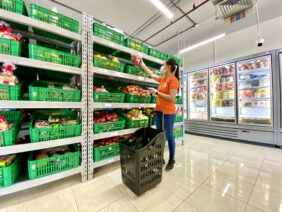
With 120 Talabat Mart stores open across the region, Delivery Hero-backed Talabat continues to be a major contributor to the MENA region’s Q-commerce (on-demand or rapid delivery) model, which is set to reach $47 billion by 2030, growing at an impressive 17 percent CAGR.
Promising delivery in under 30 minutes 24 hours a day, the Talabat Mart stores, which are inaccessible to the public, uses in-store pickers and riders to ensure efficient flow and quick delivery of orders.
“We have spaces that have been converted into small supermarkets, which are 200-300sqm. Once the order is placed (on the app), our pickers pick the products and give them to the riders, who deliver the items to customers. In this way, the picking timing is short (1 to 2 minutes), the service is available 24/7, which makes it a great value proposition for customers,” said Tomaso Rodriguez, CEO of Talabat.
All the technology within the stores, from inventory systems, scanners, and application technologies are built in-house in order to facilitate the creation of the value of speed at the same price point. Consumers’ definition and expectation of ‘fast delivery’ is progressively getting speedier – from 2-day to same-day to same-hour delivery.
“We believe the future is going to be about super-quick deliveries. In the past, people only had the option of going to a supermarket and buying products, Then Amazon came in, allowing online shopping, where you can get the orders delivered next day or two days later. We believe that in the future, convenience will be very important,” he said. “The first step is grocery, but it can be anything really ranging from electronics to fashion etc.”

Speaking of the future of delivery, Talabat is actively looking at leveraging automation and drone technologies to improve efficiency and reach a wider range of areas. “Today a big portion of our deliveries inside the Expo is done by robots. We think drones can also play a role in delivery, but it won’t replace riders and only enhance their functions. For example, the rider would go to the restaurant kitchen, bring it to the drone station and then the drone takes off and brings it to another drone station from where the rider does the last mile,” he said.
The obvious question then is, why would you want to add drones into the logistics mix, when riders are going to do the job anyway? According to Tomaso, drone will help increase the delivery range, increase the customer base for a restaurant, delivery times will be more reliable and the introduction of quick commerce will cost less.
Talabat’s new regional headquarters

Talabat recently signed a commercial lease agreement with Merex Investment to set up its regional and UAE headquarters at City Walk. The regional HQ will span almost 150,000 sq ft of premises featuring a custom-built office environment that can cater to over 2,000 employees, as Talabat’s team continues to grow. Under the agreement, Merex will convert two existing retail buildings into Talabat’s new office building.
“We are committed to supporting the growth of our partners and are delighted to welcome talabat to City Walk. talabat’s new regional HQ at City Walk represents one of the largest office leases registered in Dubai post covid as confirmed by JLLover the past few years and builds on the importance of developing mixed-use assets in the current socio-economic landscape. In line with the UAE leadership’s ambitious plans to reinvent urban spaces, the signing with talabat will allow us to be one step ahead in creating destinations that offer offices of the future with holistic, convenient and innovative spaces,” said Shahram Shamsaee, CEO at Merex Investment Group
Notifications
You must be logged in to post a comment.